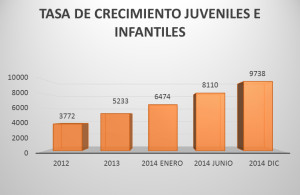With a population of 46.7 million Colombia is the fourth most populated country in the Americas with only the populations of the USA, Brazil and Mexico being larger. Those three have all regularly come up as being key markets by World Rugby in their strategic plans with the central reason being their market potential.
Share size matters and the markets must grow. Countries with the potential of self-sufficiency are the future and World Rugby has made no secret of this. it encourages the development of professional rugby in Argentina, Italy and Japan and it has gone so far as to openly invite the USA to bid to host the Rugby World Cup.
The Pacific Nations Cup offers an example of the differences that exist between big and small as Canada and the USA can host matches in a variety of cities and promote them well. Japan is no different but Fiji, Samoa and Tonga are. Small populations mean small markets and, in the case of Tonga, have seen no tests in the country since 2009.
There are no such issues in the Americas, a region with four countries competing at the Rugby World Cup this year and a region in which work is being done to assist in the development of others to see them improve their competitiveness. Argentina wants Uruguay to be stronger as it does Brazil and Chile but also both Canada and the USA.
The six countries are to come together for a new competition, the Americas Six Nations which, upon confirmation, will be an annual competition beginning in February 2016. Efforts are not limited to these six though with a second division also being planned of which one competitor will surely be Colombia.
Such a possibility was nil when Uruguay last competed in a Rugby World Cup. Indeed, rugby is so new in Colombia that there were a mere 50 players in the country in 1993. Through the dedication of volunteers who love the game this has changed to the extent that Colombia’s women are superior to Argentina’s as evidenced in the Olympic Games Rugby Sevens qualifiers in June in which Colombia finished on top to join Brazil in the tournament.
Last December the Federación Colombiana de Rugby (Colombian Rugby Federation – FRC) published player numbers in the country at being 15,067. In twenty-one years player numbers had therefore exploded and the rise continues as demonstrated in the following graph detailing youth and children playing numbers as posted by the FCR.
While there were 3,772 youth or child rugby players in Colombia in 2012 the number had risen to 9,738 at the close of 2014. It also shows that of the 15,067 rugby players in the country a majority of 9,738 are young, thereby providing a future source of international players.
The FCR is investing in the future with academies being developed precisely with the goal of improving Colombia’s competitiveness on the international stage. The number of players provides the basis for Colombia to indeed progress as although Argentina has many more players with more than 100,000 registered Colombia today has a greater number than Uruguay.
In both Argentina and Uruguay clubs have been the historic foundation with players starting at a young age and frequently remaining there for life. Hindú and Carrasco Polo being such cases in point with both having large squads both at the senior level and further down. Such a model has been pointed out by Mauricio Henao as appropriate for Antioquia state.
The state of Antioquia is joined by Atlántico, Bogotá, Risaralda, Santanderes, and Valle del Cauca as six identified Colombian regions while they are surely to be joined by others as the sport continues to spread nationwide.
The boom in playing numbers combined with improved regional competition and sustainable development of clubs makes Colombia a potential country of the future. If nurtured well there is every reason to be optimistic about Colombia reaching the level of Brazil in the coming years. Quite remarkable to think that the country only had 50 players in 1993.
 Americas Rugby News Rugby news from across the Americas!
Americas Rugby News Rugby news from across the Americas!





